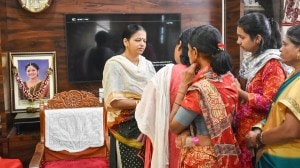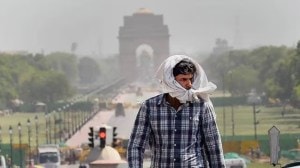- India
- International
Ernakulam’s new Assistant Collector is country’s first visually challenged woman IAS officer
Retinal detachment in both eyes at the age of eight led to Patil losing her eyesight.
 Pranjal Patil became the country’s first visually challenged woman IAS officer after taking charge as the Assistant Collector of Ernakulam on May 28 this year.
Pranjal Patil became the country’s first visually challenged woman IAS officer after taking charge as the Assistant Collector of Ernakulam on May 28 this year.
Written by Prajna Unikkumarath
Pranjal Patil took charge as the Assistant Collector of Ernakulam on May 28 this year, becoming the country’s first visually challenged woman IAS officer. Hailing from Maharashtra, she was placed 124th in UPSC 2017.
Retinal detachment in both eyes at the age of eight led to Patil losing her eyesight. “I had high powered glasses since I was a child, and then I lost sight in both my eyes in quick succession. Despite that, I was carrying on with my daily activities as usual, and because I was young, it didn’t impact me as such,” she said.
While she did undergo surgeries to reattach the retinas, they were not successful. “When the surgeries were done, I did suffer a lot. The pain did not subside until at least a year after the surgery.”
Patil’s family is her primary support, with her parents accompanying her to Kochi to see her settle down into the new assignment. “Even though this is not the first time I have moved to a place away from home, it feels very new to me because of the language barrier, and the work commitments. Only after my parents leave will I be able to assess my life here on my own,” she said.

Dressed in a beige salwar kameez, the 30-year-old said: “Considering I arrived just three days back, I am yet to interact with a lot of people in Kochi; but I did notice right away that because Kochi is tourist friendly, everyone is very accustomed to receiving new people in the city.”
Patil will hold the position of the Assistant Collector for a year as part of her training period, whose first leg she completed at Lal Bahadur Shastri National Academy of Administration, Mussoorie. After her field-training in Kochi, she will head back to Mussoorie next year to wrap up her training, at the end of which she is expected to submit a dissertation. “For my dissertation, I want to focus on a challenging aspect since basic indicators like healthcare and education are very well developed in Kerala in comparison with national averages,” she said. Observation and analysis are not new to her, as can be understood from her impressive academic record.
Patil did her schooling from Kamala Mehta Dadar School for the blind. “Everything in my school was made very accessible to me and they laid great emphasis on extra-curricular activities for the overall development of an individual.” She then pursued a B.A. in Political Science at St. Xavier’s College, Mumbai. “In school, competition among students was frowned upon. This, of course, does not hold true in the real world, and it took me time to get accustomed to that.” But perhaps one of the greatest challenges Patil faced was that of language; she went to a Marathi medium school, but her higher education was all in English. Only with hours of hard work and a well-established support system in the form of Xavier’s Resource Centre for the Visually Challenged, was she able to progress.
She then shifted to Delhi to pursue her Masters in International Relations from Jawaharlal Nehru University (JNU), after which she was admitted into an integrated M.Phil. and Ph.D. programme. Her enthusiasm is palpable as she talks about her thesis topic. “My thesis essentially focuses on Iran and Saudi Arabia’s role in Lebanese politics. I decided to focus my study on West Asia because I think the perception of the region is very misunderstood and misrepresented. It is a culturally diverse region, and I was curious to study the role that externalities play in governing the people in these countries.”
Speaking of what motivated her to pursue a career in civil services, she said, “My exposure to the culture of JNU helped build confidence in my mind to work for the right cause. The vibrant environment of the university taught me to form opinions and ask the right questions; this gave me the courage to be a civil service officer. While I had decided to write the UPSC exam when I was doing my graduate degree, I had made up my mind by the time I was in JNU.”
A firm believer of enjoying life to its fullest, she realised that attending coaching would mount unnecessary pressure on her. “If I were to attend coaching classes, I would miss out on several aspects of my life as a JNU student.” So apart from solving mock papers and attending discussions, Patil did not attend any coaching sessions to prepare for UPSC. She cracked the exam on her first attempt in 2016, where she was placed 773rd. “I felt underprepared the first time I took the exam; but for the second attempt, I knew what direction to approach my preparations from. So I was able to organize studies accordingly.” Her secret to success is simple. “I stayed away from all forms of competition when I was preparing for the exam. Occasionally I would doubt if my level of preparedness was enough, but I let the sincerity of my effort lead me.”
Her advice for students and future civil service aspirants? “No individual should be pressured into doing something forcibly. Instead of succumbing to competition, one should focus on sharpening their skills and working on their weaknesses. This would, in turn, let a person function to their full potential.”
Apr 26: Latest News
- 01
- 02
- 03
- 04
- 05








































